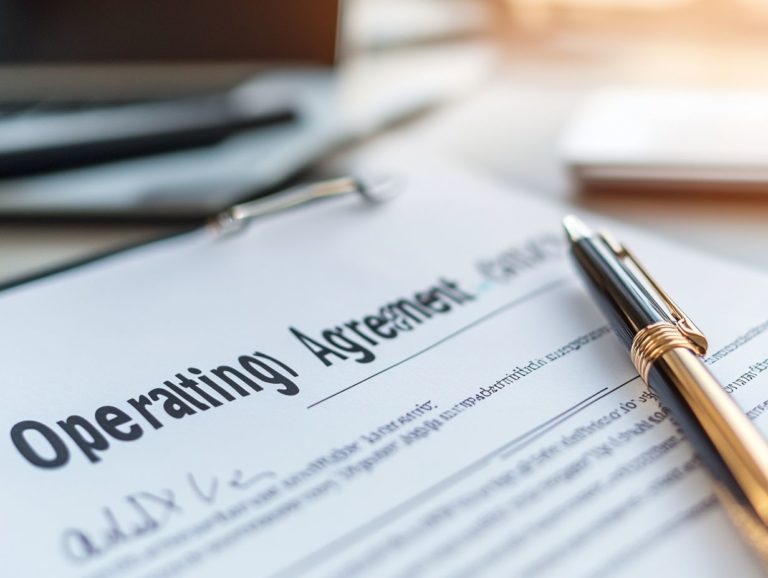Understanding Business Licenses and Permits
Starting a business is an exhilarating yet challenging endeavor. You will navigate the intricate maze of regulations and requirements.
One vital aspect to understand is the importance of business licenses and permits. These essential documents legitimize your operations and guarantee compliance with local laws.
Let s explore together the licenses you need! This article will guide you through the different types of licenses and permits, the application process, and renewal requirements while dispelling common misconceptions. Equip yourself with the knowledge needed to empower your business journey and set the stage for success!
Contents
- Key Takeaways:
- What are Business Licenses and Permits?
- Types of Business Licenses and Permits
- Obtaining Business Licenses and Permits
- Renewing and Maintaining Business Licenses and Permits
- Common Misconceptions about Business Licenses and Permits
- Frequently Asked Questions
- What are business licenses and permits?
- Do I need a business license and permit?
- What types of licenses and permits do I need for my business?
- How do I apply for a business license and permit?
- What happens if I operate my business without a license or permit?
- Do I need to renew my business license and permit?
Key Takeaways:

- Understanding the different types of business licenses and permits is crucial for compliance and avoiding penalties.
- The process of obtaining and maintaining business licenses and permits involves thorough research, completing applications, and paying fees.
- Renewing business licenses and permits is necessary to continue operating legally. Non-compliance can result in fines and even closure of your business.
What are Business Licenses and Permits?
Business licenses and permits are not just formalities; they are essential legal documents that support different business activities. They ensure compliance with both federal and state regulations.
The specific licenses you need can vary significantly based on the nature of your business, your location, and the unique requirements established by local, state, and federal agencies.
These licenses act as a safeguard for both your enterprise and the community. They ensure all operations adhere to established legal standards and safety protocols. This fosters an environment of trust and accountability in your business dealings.
Types of Business Licenses and Permits
Understanding the various types of business licenses and permits is essential for you as an entrepreneur aiming to establish a compliant and flourishing venture. These licenses can generally be divided into categories:
- Federal licenses, issued by agencies such as the Federal Aviation Administration or the Alcohol and Tobacco Tax and Trade Bureau.
- State permits, which differ based on state regulations.
- Local government licenses that cater to community-specific needs.
You may also need industry-specific licenses, such as occupational licenses (which ensure that professionals meet the required standards for their jobs), alcohol permits, and health department certifications, depending on the nature of your business activities and its location.
Industry-Specific Licenses and Permits
Industry-specific licenses and permits are essential if you re operating in specialized sectors such as healthcare, food service, or environmental services. They ensure compliance with stringent regulatory requirements. For example, if you re in the business of serving alcoholic beverages, securing alcohol permits from local authorities is non-negotiable.
If you belong to the healthcare sector, obtaining certifications from health departments is crucial. Each industry has unique requirements tailored to its operations, addressing public safety, environmental concerns, and maintaining professional standards.
In the food service industry, you must acquire food handling permits from public health agencies to ensure hygiene and safety standards are upheld. Similarly, if you re involved in environmental services, you often need to seek permits related to waste management from regulatory bodies like the Environmental Protection Agency (EPA), which play a critical role in mitigating ecological risks.
These licenses do more than just validate your business’s legitimacy; they also foster consumer trust. They underscore your commitment to safety and quality both vital for sustaining successful operations in your field. Ignoring these regulations can lead to serious legal repercussions and could potentially harm your customers and the environment.
General Business Licenses and Permits
General business licenses and permits are essential for establishing your new venture. You need these licenses to kickstart your business and comply with state and local regulations. Obtaining a business registration certificate often marks your first step in this journey, granting you the legal authority to operate in your chosen location.
Don t wait! Neglecting to secure these licenses can lead to fines, legal troubles, and even the possibility of having your business shut down. This underscores the importance of understanding your local regulations.
The process for obtaining these licenses can differ widely depending on your location. It’s crucial to familiarize yourself with the specific requirements in your area. Common legal obligations may include zoning approvals, health permits, and sales tax permits, all of which can significantly impact your day-to-day operations.
Local regulations may dictate everything from your operating hours to signage and employee safety measures. Navigating this complex landscape requires your utmost attention.
By recognizing and adhering to these rules, you not only maintain a positive relationship with local authorities but also foster a sustainable and responsible business model.
Obtaining Business Licenses and Permits

Obtaining business licenses and permits requires navigating a detailed application process. This process can vary significantly based on the type of license, the issuing agency, and the specific rules you need to follow in your local jurisdiction.
It s essential to fully grasp the necessary documentation and any associated costs or fees to ensure compliance. This journey often entails collecting personal information, financial details, and operational plans that align with local laws, ultimately setting the stage for successful business operations.
Application Process
The application process for business licenses and permits is a crucial step for you as an entrepreneur. It requires meticulous preparation and a keen eye for the rules set by the issuing agency.
You ll typically need to fill out specific forms, provide necessary documentation like proof of identity and business address and possibly undergo background checks based on your business activities. In some instances, you might also be required to appear in person at local government offices to finalize your applications.
Before you dive into those forms, gather all essential information. Ensure you have a solid grasp of local regulations. As you tackle the application forms, be prepared to face challenges such as unclear instructions or missing documentation.
To navigate these hurdles with ease, consider seeking guidance from mentors or tapping into online resources that offer valuable tips for each stage. When it s time to submit your application, double-check everything to avoid mistakes that could delay approval.
Staying organized and proactive can significantly streamline the experience, allowing you to focus on launching your business endeavors successfully.
Costs and Fees
The costs and fees tied to obtaining business licenses and permits can vary dramatically. This depends on the type of license, jurisdiction, and the specific rules imposed by local government authorities.
You should budget for the license itself and additional costs like application fees, renewal fees, and any other charges that may arise during the licensing process. Understanding these financial obligations is essential for effective business planning.
For example, a food truck might face initial fees ranging from $100 to several thousand dollars, influenced by health permits and location regulations. Conversely, a home-based business may incur much lower costs, often under $100 for basic registration.
It s crucial to weave these expenses into your startup budget. This could mean setting aside a specific percentage of your initial funding or seeking guidance from local business development centers. By factoring in these licensing costs, you position yourself to handle unexpected financial demands more gracefully.
Get started on your business journey today by securing your licenses and permits!
Renewing and Maintaining Business Licenses and Permits
Renewing and maintaining your business licenses and permits is just as crucial as acquiring them in the first place. Neglecting renewal requirements can result in significant consequences for your operations.
Many licenses come with specific expiration dates, necessitating timely renewals to ensure they remain valid. This process often involves reviewing your compliance with regulatory standards, which are the rules set by government agencies to keep businesses operating legally. Consistent diligence in this area is essential for sustaining lawful operations and avoiding fines or penalties that could jeopardize your business.
Renewal Requirements
Renewal requirements for business licenses and permits can vary greatly depending on the authority that gives licenses and the regulatory framework governing your business activities. Generally, as a business owner, you ll need to submit renewal applications before your license expires, often including updated information and possibly some fees.
Regular compliance checks are necessary to ensure you re adhering to the relevant regulations.
Some licenses might require you to submit financial statements or proof of ongoing education. Others could necessitate inspections or safety certifications.
The timelines for these renewals can differ significantly; some jurisdictions might allow just 30 days for the process, while others may take several months.
You should meticulously review the specific documentation required. Missing even a small piece of information could delay your renewal.
Understanding the role of the issuing agency is crucial it not only oversees compliance but also guides you through the intricacies of the renewal process. This helps ensure you receive your approvals in a timely manner.
Consequences of Non-Compliance

The consequences of failing to comply with business license and permit regulations can derail your operations! You could face heavy fines or even lose your licenses. Local government authorities are diligent about conducting inspections and audits to ensure compliance. If your business is found wanting, the penalties could significantly hinder your ability to operate legally.
Understanding the implications of non-compliance is essential for you as an entrepreneur to uphold your business’s credibility and viability.
Along with financial penalties which can vary widely depending on the severity of the infraction you might find yourself embroiled in costly legal battles that siphon resources and attention away from your core operations. The damage to your company s reputation can linger; clients and partners are likely to think twice before engaging with a business known for compliance failures, often opting for competitors boasting a solid track record.
To ensure adherence to all necessary regulations, it s vital for you to establish a robust compliance strategy. This could include:
- Regular employee training to keep everyone informed.
- Maintain accurate records to ensure compliance.
- Consult legal experts for efficient navigation of licensing requirements.
Common Misconceptions about Business Licenses and Permits
Common misconceptions surrounding business licenses and permits can create confusion and costly missteps for entrepreneurs. To clarify these issues, refer to understanding business licenses: FAQs, which can help prevent unintended violations of regulatory requirements imposed by local government authorities.
Many business owners mistakenly assume that one license covers all operations, overlooking the necessity for specific permits tailored to their industry and location. Grasping these myths is essential for ensuring compliance and sidestepping the pitfalls that arise from incorrect assumptions about business licensing.
Dispelling Myths and Clarifying Facts
Dispelling myths and clarifying facts about business licenses and permits is crucial for you as an entrepreneur to navigate the rules and regulations effectively. It’s a common misconception that once your business is registered, no further licenses are necessary. You may underestimate the number of permits required based on your business location and activities.
By addressing these misconceptions head-on, you can make informed decisions. This will help keep you compliant with the different rules set by local governments.
Take, for example, the myth that your business only needs a single license. This ignores that you might need more permits for specific operations, such as food safety permits or rules about how land can be used. You might open a caf and assume that a basic business license is all you need. However, you could easily overlook essential food handling permits or health inspections required by local authorities.
Understanding these requirements not only ensures you remain legally compliant but also helps you build a trustworthy reputation in your community. Ultimately, this fosters growth and sustainability.
Frequently Asked Questions
What are business licenses and permits?
Business licenses and permits are legal documents that allow individuals or companies to operate their business within a certain location or jurisdiction.
Do I need a business license and permit?

Yes, most businesses are required to have a business license and permit. The requirements may vary depending on the type of business and the location. It is important to research and obtain the necessary licenses and permits before starting a business.
What types of licenses and permits do I need for my business?
The types of licenses and permits needed for a business vary depending on the industry and location. Some common types include general business license, zoning permit, health department permit, and sales tax permit. It is important to research and understand the specific requirements for your business.
How do I apply for a business license and permit?
The application process for business licenses and permits also varies depending on the location and type of business. Most applications can be done online or in person at the local government office. It is important to have all necessary documents and information ready when applying.
What happens if I operate my business without a license or permit?
Operating a business without the required licenses and permits can result in penalties and fines. In some cases, the business may even be shut down. Don’t risk penalties! Complying with all legal requirements is crucial for your business’s success.
Do I need to renew my business license and permit?
Yes, business licenses and permits usually need to be renewed periodically. The renewal period may vary depending on the location and type of business. It is important to keep track of the renewal dates and ensure all necessary documents and fees are submitted on time.






